Check my main for my bio. None of these posts are tagged, proceed at own risk. Currently using this blog to test out new themes.
Don't wanna be here? Send us removal request.
Note
Hi Anne!!! I was wondering if you had any tips or resources for learning to analyzing texts a bit better. Stuff like being able to identify themes and symbols, figuring out an author’s intentions beyond my personal interpretation, etc. I’m okay at it, but I can’t articulate my thoughts as well as I’d like. I always love being able to catch stuff when it’s more obvious!!
Go through this playlist
252 notes
·
View notes
Text

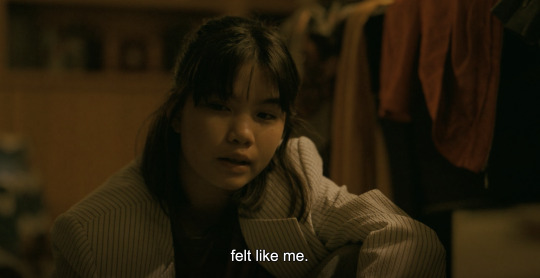

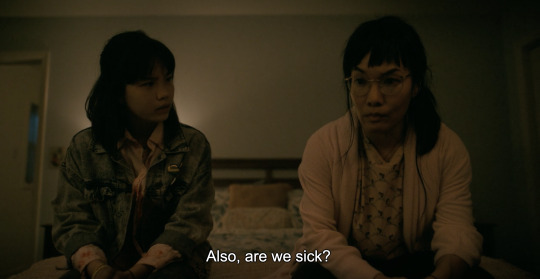
paper girls (show) gives a lot of space for the girls to interact with various older versions of themselves and it's so interesting to see what parts of a self are sort of. constant across time? like. the older selves, having grown up, are different in so many ways and often feel more like completely separate people than future iterations of the protagonists but there are things about them which rebound back on the present because if they are true in the future then it's possible that they are true in other temporalities as well. health status, sexuality, adoption status, etc.; finding out that a future version of yourself has an illness might mean you have it also; "we" are sick rather than "you" are sick. however, future mac's illness has much more decisive consequences for past mac than future erin's does for past erin.. idk very interested in what parts of the future are just that, future, and what parts of the future necessarily imply something about the present or past
130 notes
·
View notes
Text
can anyone tell me the watch order for every movie ever so i can understand all references and homages
42K notes
·
View notes
Text

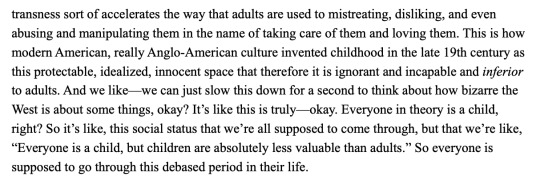
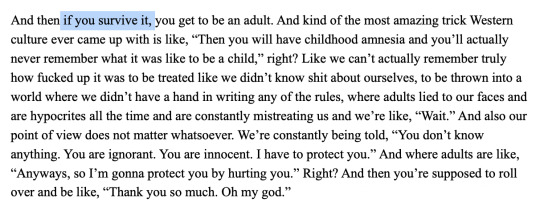


[ID 1, 2: But that actually only gets us so far when it comes to young people and actually, a lot of the problems that trans youth face, although they would be greatly improved if we could deal with some of that anti-trans hatred at the core of the world we live in, it actually wouldn’t be fully resolved. Because a lot of the problems trans youth face have to do with being children, and their transness sort of accelerates the way that adults are used to mistreating, disliking, and even abusing and manipulating them in the name of taking care of them and loving them. This is how modern American, really Anglo-American culture invented childhood in the late 19th century as this protectable, idealized, innocent space that therefore it is ignorant and incapable and inferior to adults. And we like—we can just slow this down for a second to think about how bizarre the West is about some things, okay? It’s like this is truly—okay. Everyone in theory is a child, right? So it’s like, this social status that we’re all supposed to come through, but that we’re like, “Everyone is a child, but children are absolutely less valuable than adults.” So everyone is supposed to go through this debased period in their life.
ID 3: And then if you survive it, you get to be an adult. And kind of the most amazing trick Western culture ever came up with is like, “Then you will have childhood amnesia and you’ll actually never remember what it was like to be a child,” right? Like we can’t actually remember truly how fucked up it was to be treated like we didn’t know shit about ourselves, to be thrown into a world where we didn’t have a hand in writing any of the rules, where adults lied to our faces and are hypocrites all the time and are constantly mistreating us and we’re like, “Wait.” And also our point of view does not matter whatsoever. We’re constantly being told, “You don’t know anything. You are ignorant. You are innocent. I have to protect you.” And where adults are like, “Anyways, so I’m gonna protect you by hurting you.” Right? And then you’re supposed to roll over and be like, “Thank you so much. Oh my god.”
ID 4: And I think that I tend to be pretty polemic about this when I talk about this because I am, you know, a historian of childhood. It’s like, you have to do a little bit of deprogramming, right? We have actually all been taught since before we could consent, to accept being mistreated, to accept being harmed in the name of being cared. We are told that it’s okay to infantilize and make people vulnerable and put them in situations where they’re at the whim of institutional adult power because it’s good for them. It’s literally all victim blaming! Right? And so when that situation is rigged, and every single one of us has been put through a kind of brainwashing, right, because we’re all raised in that culture, right. And then we’re asked to perpetuate it. I mean, it’s just staggering, right? I mean, it’s really, it’s intense, right.
ID 5: But I think one of the lessons that I thought a lot about, right, is like if we could just cut through the fake moral panics around trans people, then we’d get to the real heavy lifting, which is why do we dehumanize and mistreat children on such a widespread scale that we actually have to actively lie to ourselves and mislead ourselves as a culture every second of every day? end ID]
the text above is from jules gill-peterson's gender reveal podcast episode but one of the other things i can't stop thinking about re: paper girls is how it functions as a critique of the way that childhood is lived for adulthood. childhood comes with so much abuse, as described above, and the way that it's justified is in large part by encouraging kids to have huge dreams for their futures -- president, ceo, celebrity -- that will make the years of hardship worth it and turn it all into the first chapter in a story of rags to riches that they'll be proud to tell; the more broad, bootstrappy idea that you have to go through something hard to get to something great operates in the context of childhood in a powerful way. but what happens when the child shows up to confront the adult and finds that their future is not exceptional after all? how is the child supposed to justify their suffering-filled present if not with the mirage of the perfect future where suffering has been transformed into hard-earned success? the kids in paper girls judge their future selves so harshly, and their adult selves have no answers for them as to why they have not become what they dreamed of as children. it is an extremely powerful thing to watch a child ask their grown-up self, why did i suffer this way? and come to understand that there was no justification at all, that the adults who told them it was necessary in service of who they would later become were selling them a lie.
341 notes
·
View notes
Text
fun fact: theres a google sheet thats filled with LITERALLY EVERY SINGLE SOUND SOURCE, INSTRUMENT, SOFTWARE, AND SAMPLE that toby fox has ever used in any of his music, and many sound effects too
its literally thousands of lines long, and its about to get a heck of a lot longer in around a week
super interesting to skim through, especially if youre at all interested in how music is made
391 notes
·
View notes
Text
its crazy how nobody has ever been as objectively beautiful as danny john-jules in red dwarf and nobody ever will be again
15K notes
·
View notes
Text
Reading hitchikers guide for the first time was really funny because it was like ohhhh THIS the writing that every unfunny nerd has been trying to emulate from like ‘00-‘12 . But good.
38K notes
·
View notes
Text
“I think there is a general misconception that you write poems because you “have something to say.” I think, actually, that you write poems because you have something echoing around in the bone-dome of your skull that you cannot say. Poetry allows us to hold many related tangential notions in very close orbit around each other at the same time. The “unsayable” thing at the center of the poem becomes visible to the poet and reader in the same way that dark matter becomes visible to the astrophysicist. You can’t see it, but by measure of its effect on the visible, it can become so precise a silhouette you can almost know it.”
— Rebecca Lindenberg, from Why Write Poetry? (via violentwavesofemotion)
19K notes
·
View notes
Text
not to chicago post again but it's so funny (bad) (stupid) how the movie rewrites roxies character so that the lawyer isn't even lying that much in "we both reached for the gun." what even is the point of the song then. i feel like the writers kind of lost the plot here.
22 notes
·
View notes
Note
Hi, I have a friend who likes Marxism but takes issues with it. One of which is he doesn't like how it refers to stages of history. He thinks it's wrong to describe stages of history, especially those of indigenous Americans (we're both US Americans, sorry) because they weren't primitive. Am I tripping or this a weird misunderstanding of the stages? To me they don't prescribe any real like "development status" rather they're only really their to describe the relation to the means of production no? I think I understand his criticism but I'm wondering if you have any ideas.
i mean i definitely think that a lot of the ways that marx and engels discuss history, especially their opinions on 'primitive' societies, are rooted in the anthropologhical scholarship of their day and are as a result profoundly racist--at the same time, the normative developmentalist character of marx's theory is vastly overstated, both by critics and indeed by many marxists. i found glen coulthard's red skin, white masks to be a very engaging work that grapples with these issues -- more generally, i think looking into the work of indigenous marxists around the world, almost all of whom have advanced, refined, critiqued, etc. marx's own analysis of settler-colonialism and indigenous societies
481 notes
·
View notes
Text
Hi here’s another list of things I’ve read that are really important to me, on the loose theme of ‘fantasy urbanism.’ I still haven’t read Dhalgren.
Invisible Cities by Italo Calvino. This is the most essential thing to read if you are even tangentially interested in anything about this list i think. Revelatory to me as a pulpy-literalistic fantasist.
Imaginary Cities by Darran Anderson. Inspired by the Calvino book, an enormous overview of planned or dreamed cities that were never built.
Kalpa Imperial by Angélica Gorodischer. Some of my favorite secondary-world fiction I have ever read. Short stories from the history of an empire at the ludicrous extreme of size, depth, history. The English edition was translated by Ursula K. Le Guin who is my favorite.
A Stranger in Olondria by Sofia Samatar. Beautiful book and deals with an invented setting and urban spaces with a more densely intellectual approach than I have ever seen.
Delirious New York by Rem Koolhaas. An architectural history and “retroactive manifesto” for Manhattan, but some of the most interesting bits are about Coney Island in particular. Huge futuristic conflicts underlie every modern city.
The City & the City by China Miéville. This isn’t a lot of people’s favorites of his because its fantastic elements aren’t the loudest, but it’s so smart and bewildering and develops an allegory for emergent social strata in urban spaces that is really compelling.
The Event Factory by Renee Gladman. Just finished this; it feels loose and dreamlike and engages very clearly with real feelings of exploring new spaces, radically repurposing urban environments…
Country of Ghosts by Margaret Killjoy. Not as totally concerned with cities as the rest of the list, but a really exciting and unusual example of worldbuilding from an intentionally political/utopian perspective.
Surregional Explorations by Max Cafard. The first few essays in this book deal with Surrealist and Situationist approaches to urban space and the unconscious of cities; it’s a weird jumbled book but I liked it
7K notes
·
View notes
Text
Hooker Mentality is here!

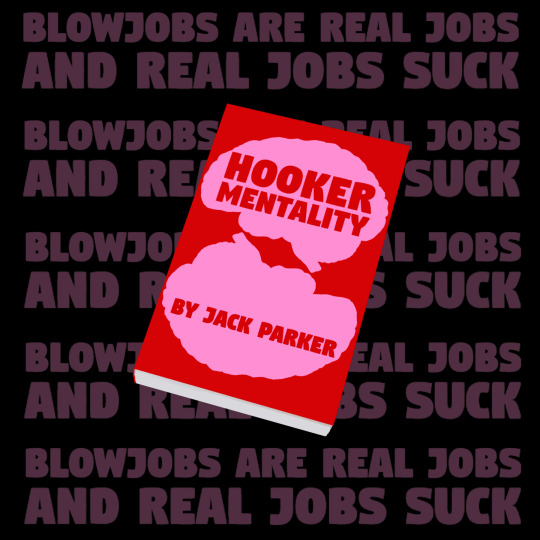

Read some leftist theory from a sex worker perspective. Available for pre-order now.
This book is the culmination of what I have learned from being a hooker for almost a decade, as well as what I have been taught by the countless sex workers around me and those who have come before.
Hooker Mentality covers what hookers' experiences reveal about capitalism and gender and policing. It delves into the ways that selling sex can give sex workers an insight into the systems which control us all, exposing why so many of us become radically left-wing after we start selling sex. If you want to be an ally to sex workers, you need to understand our mentality.
You can read a preview here:
The publication date is June 27th, and you can get it here! For those outside of the UK, get your pre-orders for paperbacks in by June 6th to guarantee your book arrives by then.
Please feel free to send this to friends you think would be interested, or to share this post or the preview from the link above! Online censorship around the topic of sex work can make it hard to get the word out.
506 notes
·
View notes
Text
is incredible how The wolf of wall street and the big short are so starkly the obverse face of one another, the negative space, the polar opposites.
they are both an examination of the world of wall street, they are both a look at the kinds of people that inhabit that world, the kinds of people who handle millions and billions as a daily matter, about the gross excesses of this world, about how these people cause untold, unnacountable, reckless harm, and how vapid and cynical and empty their greed is.
they are, in short, these big criticisms of capitalism and of the capitalists that keep the system as rotten as it is.
and yet they are such incredibly different movies on almost every regard. its almost like a caricature of a personality test. "the chad X/the virgin Y"
the wolf of wall street is this big, loud, bold, boorish movie about outrageous people doing outrageous things. its about excess and decadence. its all about an evil man and how evil and morally bankrupt and degenerate he is. he does wild things like kinky sex and hardcore drugs and these are some of the indicators of how morally repugnant he is (along with his racism, sexism, exploitation of people, etc). its a movie that is grotesque and cartoonish and over the top and slimy, and its specifically about this one man, this one evil individual who works as the avatar of capitalism itself, the incarnation of the capital sin of greed. this guy is The Billionaire (tm) who commits all the sins of billionaring too hard. its about how this one evil guy got away with everything and ho the forces of good (represented by a humble, working class fbi agent) were ultimatly powerless to really stop him.
the big short on the other hand is an almost painfully dry, sardonic, unassuming, extremely academic work. often confusing, hard to keep track of what the hell is going on or what people are talking about. a lot more concerned with structures, with incentives and regulations. Is a thoroughly systemic critique. It allows itself to be much more dour and depressing. Whereas the wolf of wall street never lets go of the gas, the big short has many quiet somber moments that hit you like a splash of cold water. There is also no real good guys or bad guys in it. Well, there are some bad guys but the movie makes it clear that they are ultimatly as much a cog on the machine as the good guys. The protagonist themselves keep being hit over and over with how much their own hands are dirty and how powerless they are to stop any of it.
you can probably tell which work i think is the superior one.
I think what ultimatly cinches it for me is how they deal with the common man. The people who ultimatly get screwed in the proceedings.
In the wolf of wall street the victims are just disembodied voices on the other side of the phone. And they are suckers. Ultimatly they choose to give their money to a conman. They are naive and trustful and ignorant. The way in which they are presented leaves you with the reassuring idea that you would never fall for a conman as obvious and sleazy as belfort. Just say no.
In the big short we see their faces, we see them as people, with families, with jobs, struggling to pay rent. Trying to keep their home. And most heartbrealing of all we see one of the families having lost everything and presumably living in their car by the end of the movie. And there is nothing they could have done. There was no action, no knowledge, no wisdom they could have had that could have saved them. That is just how the system works.
I am someone who likes to think of systems, of institutions. I am someone who thinks that big systemic critiques and analises of giant sociological forces are the most effective lenses to understand the problems in societies.
So, yeah, the second movie flatters my intuitions a lot more
219 notes
·
View notes
Text
weirdest tabletop experience i ever had
be me in 2022
download a bundle of tabletop games at 3 am
find a giant pdf labeled "act one"
it's a game played by only exactly three people on different levels of reality.
you also play alternate universe versions of your characters on different levels in reality
secrets in the book are written in mirror writing
the whole book is an in-universe preserved text by someone in a different universe
i am so into this game.
best thing i've ever read.
i tell all my friends about it the next day.
"sounds cool, what's it called?"
i can find no evidence of this game.
i can find no evidence that this game ever existed.
i'm not even sure what bundle it was in.
all my friends develop the theory that this game is a dream i had.
they tease me about The Time Bird Dreamed An Entire TTRPG That Could Only Be Read In A Mirror
i find the game three years later
it's about dreams
anyway if you wished Invisible Sun was weirder you may enjoy Disparateum by Rathayibacter
9K notes
·
View notes
Text
I was discussing one of my blackpills among the repressor oracle and realized that transmasculinity has nothing to say and nothing to contribute to masculinity classic. It doesn't propose any sort of conceptual threat to men, as we try and climb up a ladder rather than take an immediate redpill, at least conceptually, there is no way for a woman to 'become a man' in any sense without the effort. (This and it being harder to be a trans woman are why ftm reppers are rarer, btw.)
This is why, in tandem with the lack of obligate social cohesion amongst males (with exceptions for marginalized male groups), many of us revert to woman in some sense. It has nothing to do with the inherent cunning duplicity and disingenuousness or illigetimacy of the individuals involved. The male alliance doesn't naturally exist and has to be artificially engineered to ideological ends or to attempt to fill some sort of need, either by the right or the left wing (toxic masculinity as a term wasn't created by complaining feminist women but rather a leftie men's 'alliance' type group, originally)-- when leftie men do this and discuss its intersections with trans, they mean the possibility that some of the men among them are... not... transfemininity poses a conceptual threat to men with which cis men must contend, and they're right to try, yes. they're not speaking to nor about ftms, the assumption is an automatic understanding with the group of origin(women) with queer people in general or a self-selecting tguy space. I'd argue that points one and two are obviously not always true but are for some reason taken as a given, and option three is a viable solution, but let's not pretend that masculinity is under any current social nor political pressure to absorb, it has not been taken to the same task that womanhood or feminism has. Yes, I mentioned that the marginalized group alliance thing exist for the males, too, and wouldn't ftms be that? Yes, you would think, but one must contend with the nature of that marginalization which is precisely that ftms are "not men". So unlike other groups, the 'base case default' of "trans" is not 'trans men'.
It is so funny to watch theorists self-styled or otherwise (go on trans twitter to see examples of this or read that medium article on 'trans masc misogyny and the red six of spades' for a summary) try so hard to avoid the next logical conclusion of 'trans women are women, and as evidence of this, they're victims of misogyny'... this argument has successfully been made, and I agree. But I also sort of think that both trans women and trans men are women and nobody on the left will ever say that but that's my blackpill. It is not a physiological blackpill, though I could spin the phrenology wheel of fortune but that's played out by every other shitty self hating trans person... this is a social, cultural, political blackpill. Again, as I've said, you may want the impossible, yes, but I will not use that against you, I will want the impossible with you and for you.
back to the medium article, it ends like this, after arguing that there's no specifically trans masculine experience: "Living on a border can mean feeling connected to everything and everybody. It can also mean feeling like nothing and nobody, particularly when the dominant culture refuses to admit that you exist. I believe it is the underlying threat of zero-ness — that fear of being canceled out, rendered unthinkable and illegible — that drives much shitty trans masc behavior." I'd argee with the author, but I'd say that the threat of nothingness and lack of conceptual existence has for us already materialized, and has been happening since forever. Curiously, no solutions to this problem are offered, but I think even though it's entierly mired in the nuances of twitter arguents between milennial microceleb wannabe public intellectual types, a culture which I couldn't give less of a fuck about personally, it's an interesting musing on the same problem.
I refuse to blame trans women for this problem, btw. And I will always acknowledge that I will always have it easier in general. But I think that the woobification and aggressively un-political and un-sexualized nature of 'transmasculine culture' is obligate, in that lack of any narrative at all and lack of a politically justifiable positive identification and lack of visibility does translate to material effects (we're more likely than not to eventually try out suicide: look it up) that memeified infantile complaints of 'erasure' don't do justice.
but I'm a dumb repressor and a self-identified autohomoerotic and a trender and a theyfab and refuse to just be butch and a faggot and have no lesbian past and am also a privileged bitch so idk.
8 notes
·
View notes
Text
[“Khiem thao and the Front’s political education in general was what Westerners called “thought control” or “brainwashing.” Of all the aspects of the Vietnamese revolution, it was this domination of the individual by the state which Americans — even those most opposed to their government’s policy in Vietnam — found most difficult to come to terms with.
On their trips to Hanoi in 1968 the writers Mary McCarthy and Susan Sontag discovered to their dismay that the North Vietnamese they met seemed to speak entirely in Communist jargon. “Everything is on one level here,” complained Miss Sontag to her journal. “All the words belong to the same vocabulary: struggle, bombings, friend, aggressor, imperialist, patriot.… I can’t help experiencing them as elements of an official language.” Had Miss Sontag been any less sympathetic to the North Vietnamese, she might have simply concluded that they were “brainwashed victims of Communist tyranny” — though they did not seem to be, for there was not a heavy atmosphere of Stalinism about them. On the contrary, they seemed to take a lucid, almost childlike pride in their government.
In Eastern Europe many intellectuals had made it plain to Miss McCarthy that the official language was an oppressive weight upon their normal speech, but the North Vietnamese seemed to possess no other kind of rhetoric. Neither of the writers could dispute the truth of their hosts’ words (the Americans were indeed, they felt, “imperialists” in Vietnam), but they could not help feeling that the North Vietnamese were in some way children, or, as they were not children, people who lacked a dimension of sensibility. Without any rebelliousness, indeed with a kind of joy in their achievement, the North Vietnamese seemed to have suppressed their private lives, their very personalities, in order to act out the cardboard role of “patriotic citizens.”
Miss McCarthy and Miss Sontag saw in North Vietnam what no American official had ever prepared them for: the very foreignness of the Vietnamese. The familiarity of the Communist language was in many ways a deception, for the Vietnamese were not like the Russians or the East Europeans. As Miss Sontag rightly concluded, the Communist ideology was not responsible for the social discipline of the Vietnamese. Rather, the impetus to such discipline rose out of traditional Vietnamese society.
Traditionally, the Vietnamese notion of society was not that of an aggregate, a collection of people, but that of a complete organism. The whole of society was much greater than the sum of its parts because it reflected and duplicated the overall design of the universe. Within his society the individual had no separate existence. His sense of personal identity came from his sense of participation in the society and in the universe. The moral problem for the individual was to discover not what he himself thought or wanted, but what the society required of him. The goal of speech was less to express the individuality of the ego than to arrive at a harmonious relationship with others and with the laws of the universe. “Truth” was not a conquest of reality, but an attempt to harmonize with it — an ethical as well as a scientific goal.
The French invasion effectively destroyed the Confucian design for society and the universe. It did not, however, change the impulse to a social and ideological coherency. For the Vietnamese “freedom” in the Western sense meant the disjunction of the ego from the superego. A disintegration of the personality, it led only to social chaos and the exploitation of the weak by the strong.”]
frances fitzgerald, from fire in the lake: the vietnamese and the americans in vietnam, 1972
27 notes
·
View notes
